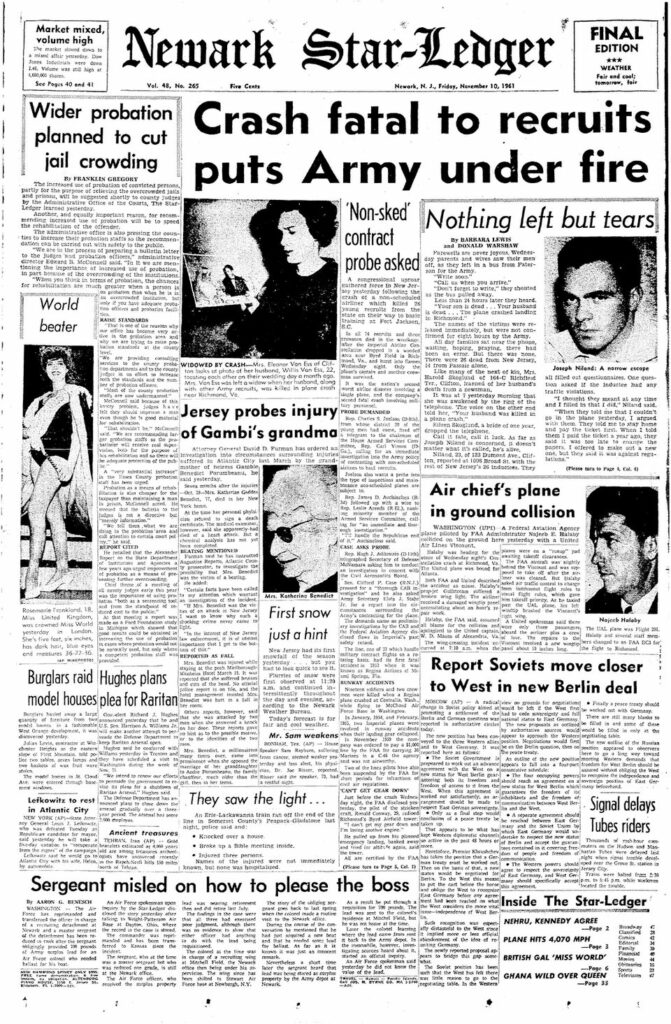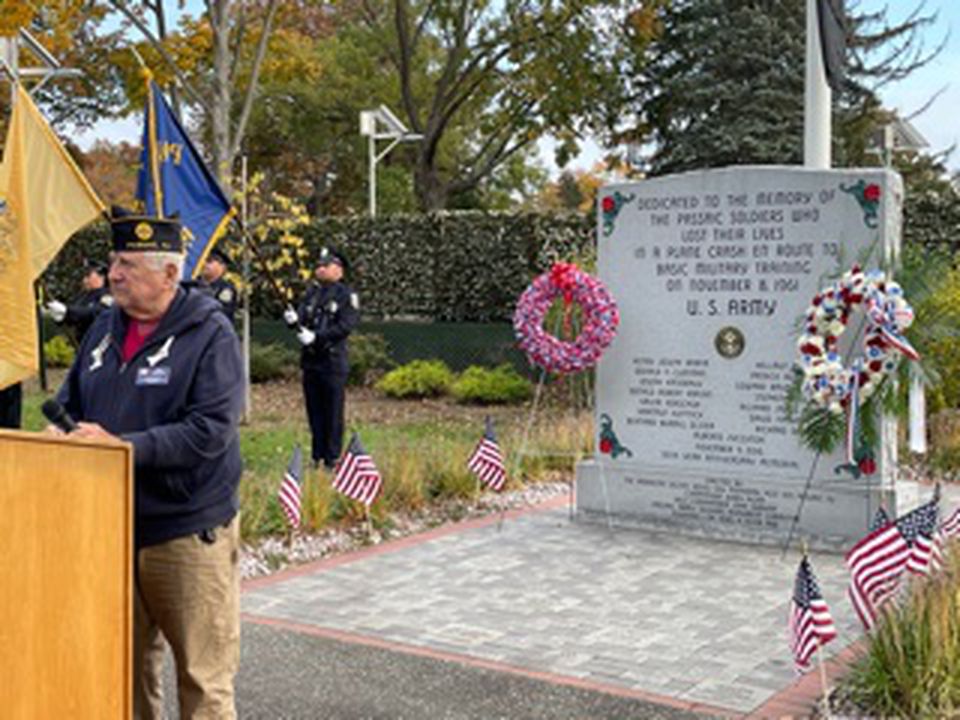Sixty years ago this week, a charter plane with 26 Army recruits from New Jersey took off from Newark Airport, bound for Basic Training at Fort Jackson, South Carolina. They never made it.
After making stops that evening in Wilkes-Barre, Pa. and Baltimore, Md., to pick up more recruits, Imperial Flight 208/1 turned south and sputtered toward its destination.
But just outside of Byrd Field in Richmond, Va., the pilot radioed that he had engine trouble, and the plane crashed and burned in a wooded area after a failed attempt at an emergency landing.

All told, the crash claimed the lives of all 74 Army recruits on board, their bodies found stacked against doorways that wouldn’t open when they tried to escape the smoke and that smothered them. The only survivors were the pilot and the flight engineer, who crawled through a broken window in the cockpit.
Just hours after taking the oath to serve their country, 74 recruits were dead, casualties before they ever even got the chance to wear the uniform.
The crash cast a pall over the nation. But nowhere did the pain run deeper than in the City of Passaic, which lost 15 young men that day.
“I remember I was playing the piano, and my mother came into the room and told me that my cousin Donald was dead,” recalled Jane Gurtman Grubin, the cousin of Donald Gurtman, one of the 15 Passaic residents who perished that day. “At that very moment, I was playing arpeggios from a piece called ‘Angels Voices’ when my mother came in and told me Donald was dead and I started to cry.”

Grubin still lives in Passaic, and she recently spent three days placing American flags on the graves of veterans buried nearby in Menorah Cemetery. She thought about Donald a lot, she said.
“He was like the Jewish James Dean,” she sighed. “Black, curly hair, and a black leather jacket. Very good looking.”
The neighboring city of Clifton had four young men aboard Flight 208/1. It was a huge loss and a painful time in and around the two cities. Suddenly, there were a lot of funerals to go to.
“I remember the sadness and angst, and the palpable anger that was in the air,” recalled Joe Dudek, who was nine years old at the time. Sadness, because so many young lives had been snuffed out. And anger because the whole tragedy seemed preventable.
News accounts reveal that just a day after the crash, members of New Jersey’s congressional delegation were calling for a federal investigation into the mishap. The target: the Army’s well-known practice of chartering planes from low-budget private carriers.
Commonly known as “Non-Skeds,” these mom-and-pop airlines often used old, rickety planes left over from World War II. Safety standards were lax, and the crews tended to be poorly trained. Non-Skeds had been responsible for several previous accidents that claimed the lives of Army personnel, but nothing on the scale of what happened on the night of Nov. 8, 1961.
A day after the crash, Rep. Hugh J. Addonizio (D-11th District) called for a congressional investigation into the Non-Sked industry. “One factor which should be given immediate consideration is the question of whether the Army is purchasing the services of non-scheduled airlines at rates sharply under first-class fares and a less safe type of transportation,” Addonizio told the Star-Ledger. “If this is so, remedial steps should be taken at once.”
Those words were little solace to the families and friends who lost loved ones.
Dudek’s brother, Eddie was supposed to be on that flight. He’d joined the Army and was sworn in with the others that morning in Paterson. He wanted to fly to boot camp with his two buddies from Passaic, Patrick Purcell and Steven Soltesz, but when he tried to board Flight 208/1 at Newark Airport, the sergeant told him he wasn’t on the list and so he had to take another plane.
It was luck of the draw that saved Eddie’s life. But it wasn’t something he boasted about—even to his dying day, his brother said.
“He lived with that all his life,” said Dudek, 68, who now lives in Rockaway Township. “It definitely affected him. It wasn’t survivor’s guilt, but it was just that he was mournful.”
An investigation by the Civil Aeronautics Board later determined that the crew caused the crash by mistakenly dumping fuel from two engines, causing them to conk out. The board also found that the crew had never been trained on what to do in an emergency.
The investigation found that all the soldiers died of carbon monoxide poisoning — not the impact of the crash or the fire — and were trapped inside when the doors wouldn’t open. No one was ever criminally charged, but the federal government lifted Imperial Airlines’ license and the carrier went out of business.
The story faded with time, and it wasn’t until the 50th anniversary in 2011 that Passaic’s city historian asked the council to erect a monument. The council didn’t act, and it wasn’t until 2016 that the local American Legion post stepped in and raised $40,000 to erect a monument to the 15 Passaic recruits who became casualties on their first day in the Army.
On Thursday, veterans, friends and a few family members of the deceased gathered at the monument to lay a wreath.
John Dubyna, the vice commander of the Rosol-Dul American Legion Post 359, said that even though these recruits spent less than one full day in the Army, they are veterans and deserve to be honored.
“As far as I’m concerned, as soon as you take the oath of office, you’re a soldier,” he said.
“We must not let our history die,” added Minnie Hiller, the district commander for Veterans of Foreign Wars, who is also from Passaic. “We must continue to tell their story. We must never forget these soldiers, who went off to serve their country and the plane went down.”
The 26 New Jersey soldiers who died in the crash are: Henry Barna, 22; Robert A. DeVogel, 23; Donald M. Gurtman, 22; Donald R. Kaplan, 22; Valeri Korschok, 22; Hartmut Kutnick, 21; David N. Moore, 21; Bernard M. Olster, 22; Helmut Petratschek, 24; Patrick R. Purcell, 22; Edward R. Shamberger, 22; Steven P. Soltesz, 22; Richard D. Wall, 22; Alberto Zycynski, 23, and Richard J. Vanderhoven, 22, all of Passaic; Vernon F. Griggs, 23; Robert J. Marositz, 22; Robert Rinaldi, 21; and Harold Skoglund, 22, all of Clifton; Steven P. Pados, 22, of Wayne; Joseph Kandravy, 22, of Garfield; Willis Van Ess Jr., 22, of Rutherford; Richard D. Hogenbirk, 22, of East Orange; William P. Black Jr., no age given, of Jersey City; Theodore M. Monson, Jr., no age given, of North Bergen; and John A. Shebanie, 22, of Farmingdale.
___
© 2021 Advance Local Media LLC
Distributed by Tribune Content Agency, LLC.



